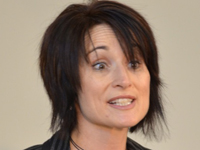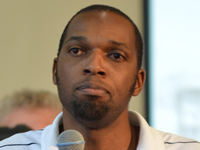|
 
|
Dr Lynette van der Merwe and Mr Fred Mudanvanhu
Photo: Stephen Collett
08 November 2012 |
Dr Lynette van der Merwe from the Department of Basic Medical Sciences was announced as the winner of the Vice-Chancellor’s award for Teaching and Learning 2012. This award celebrates the excellent work done by academics in their classrooms. Mr Fred Mudanvanhu from the Computer Science and Informatics Department was named winner of the Excellence in Teaching and Learning award on the Qwaqwa Campus. They received their awards during the first Excellence in Teaching and Learning Week held on the Bloemfontein Campus from 29 October to 1 November 2012.
Hosted by the Centre for Teaching and Learning, the week was a showcase of scholarly teaching in various disciplines and innovation in teaching and learning practice. Some of the top academics at the university exhibited and presented their scholarly contributions in the form of presentations, short videos and electronic posters. This celebration of excellent work done by academics started on 24 October 2012, with the Excellence in Teaching and Learning Day on the Qwaqwa Campus.
Dr Francois Strydom, Director for the Centre for Teaching and Learning, said presentations made during Excellence in Teaching and Learning Week, especially those by the candidates for the Vice-Chancellor’s award for Teaching and Learning, demonstrated cutting edge, reflective scholarship.
He said Dr Van der Merwe’s innovative practises in teaching and learning stem from her Ph.D. research on Generation-Y learners and what their specific preferences are within the context of the Faculty of Health Sciences. “She illustrated how important it is for lecturers to reflect on the characteristics of the students that they are teaching to find the optimal balance between face-to-face interaction and the use of technology to engage the current generation.”
Mr Mudanvanhu was singled out for his research that contrasted the impact of different types of combinations of peer facilitated learning with the technology to improve students’ success.
Speaking at the teaching and learning awards function,Prof.Driekie Hay, Vice Rector:Academics, said the celebration of excellence indicates the pursuit towards developing the next generation of teachers, doctors, architects, scientists and researchers, to name a few. “The graduate that we educate today is the next president, the next Nobel prize winner or your grandchildren’s teacher.”